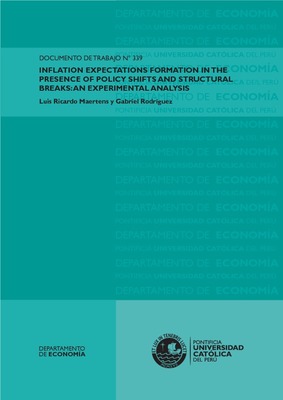| dc.contributor.author | Maertens Odría, Luis R. | |
| dc.contributor.author | Rodríguez, Gabriel | |
| dc.date.accessioned | 2015-03-19T20:37:54Z | |
| dc.date.available | 2015-03-19T20:37:54Z | |
| dc.date.issued | 2012 | |
| dc.identifier.uri | http://repositorio.pucp.edu.pe/index/handle/123456789/46980 | |
| dc.description.abstract | En este documento se muestra cómo las expectativas de inflación son formadas y si cambios en la política o cambios estructurales influencian en dicha formación. Cuatro experimentos son realizados con 75 individuos no experimentados donde se solicita predecir la inflación doméstica futura y reportar intervalos de confianza. En tres momentos de los experimentos se solicita adicionalmente información referente a la incertidumbre de las predicciones. El diseño permite contar con 6750 puntos de predicción de inflación doméstica e intervalos de confianza. Los resultados muestran que: (1) las expectativas de inflación son raramente racionales; (2) en general, los individuos ignoran información valiosa y tienen tendencia a prestar atención al comportamiento tendencial pasado; (3) la adopción de metas de inflación aumenta el número de individuos que predicen en forma racional y reduce la incertidumbre acerca de la inflación futura; y (4) una recesión reduce el nivel de racionalidad entre los individuos, más aún los induce a esperar que la inflación revierta hacia su media. | es_ES |
| dc.description.abstract | In this paper we study how inflation expectations are formed and whether these change due to the occurrence of policy shifts or structural breaks. We conduct 4 experiments with 75 inexperienced subjects, in which we ask them to predict future home inflation and report confidence intervals. At three points in time during our experiments, we also ask our participants to provide additional information regarding the uncertainty about their expectations. Our design allowed us to gather 6750 home inflation point forecasts and confidence intervals. We find that: (1) inflation expectations are seldom rational; (2) our subjects generally ignore valuable information and, instead, tend to pay close attention to past trends; (3) the adoption of inflation targeting increases the amount of subjects that forecast in a rational fashion and reduces the uncertainty about future inflation; and (4) a recession reduces rationality among forecasters, yet induces them to expect inflation to revert to its mean. | en_US |
| dc.language.iso | spa | es_ES |
| dc.publisher | Pontificia Universidad Católica del Perú. Departamento de Economía | es_ES |
| dc.relation.ispartof | urn:issn:2079-8466 | |
| dc.relation.ispartof | urn:issn:2079-8474 | |
| dc.relation.ispartofseries | Documento de Trabajo;339 | es_ES |
| dc.rights | Atribución-NoComercial-SinDerivadas 2.5 Perú | * |
| dc.rights | info:eu-repo/semantics/openAccess | es_ES |
| dc.rights.uri | http://creativecommons.org/licenses/by-nc-nd/2.5/pe/ | es_ES |
| dc.title | Inflation expectations formation in the presence of policy shifts and structural breaks: an experimental analysis | es_ES |
| dc.title.alternative | Formación de las expectativas de inflación en presencia de cambios de política y brechas estructurales: Un análisis experimental. | es_ES |
| dc.type | info:eu-repo/semantics/workingPaper | |
| dc.type.other | Documento de trabajo | |
| dc.subject.ocde | http://purl.org/pe-repo/ocde/ford#5.02.00 | |
| dc.publisher.country | PE | |
| renati.advisor.orcid | https://orcid.org/0000-0003-1174-9642 | |


